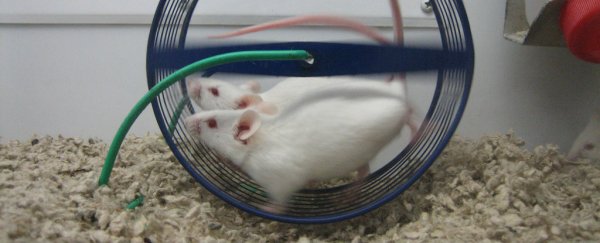Mice that run between 4 and 7 kilometres a night (that's 2.5 to 4.3 miles) are better able to fight off cancer, a new study has found. The exercise appears to boost their immune system, prevent new tumours from appearing, and slow the growth of existing tumours by over 60 percent.
It looks like the release of adrenaline is crucial to the whole process, researchers from Denmark report, because as the levels of this stress hormone rise, the immune system dispatches more of its natural cancer-fighting cells into the bloodstream, where a substance called interleukin-6 (also released by exercise) directs them to the cancer tumours. Similar effects were noticed across different types of cancer in mice, including skin, lung, and liver.
Although the exercise didn't shrink cancer tumours that were already present, it's still a promising step forward in understanding how these growths can be limited. The next stage is to see if the same effect can be observed in humans. "It's the first time we've shown that exercise can directly control the growth rate of tumours," lead researcher Pernille Hojman from the University of Copenhagen told New Scientist.
"We already know that exercise has an impact on natural killer cell activity, but this is the first time anyone has shown it's directly involved in helping them invade tumours," added Lee Jones of the Memorial Sloan Kettering Cancer Centre in New York, who wasn't involved in the study. "This is a big piece of the puzzle that's been missing."
The scientists also found that injecting adrenaline had a similar effect on the mice, and sure enough, the number of natural killer (NK) immune cells rose again.
"As someone working in the field of exercise and oncology, one of the main questions that cancer patients always ask is: how should I exercise? Can we do anything?" says Hojman. "While it has previously been difficult to advise people about the intensity at which they should exercise, our data suggests that it might be beneficial to exercise at a somewhat high intensity in order to provoke a good epinephrine surge and hence recruitment of NK cells."
Hojman and her team now want to see if they can achieve the same results over a longer period of time and figure out how exercise could fit in with other existing cancer treatments to give human patients a more positive prognosis.
The team's work has just been published in the journal Cell Metabolism.
Of course, you shouldn't wait until you're hit by disease to get up off the couch: regular activity has been shown to extend your lifespan, improve your mood, boost the grey matter in your brain, and reduce the risk of cancer appearing in the first place.
